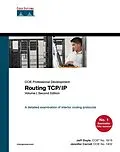A detailed examination of interior routing protocols -- completely updated in a new edition
Praised in its first edition for its approachable style and wealth of information, this new edition provides readers a deep understanding of IP routing protocols, teaches how to implement these protocols using Cisco routers, and brings readers up to date protocol and implementation enhancements. Routing TCP/IP, Volume 1, Second Edition, includes protocol changes and Cisco features that enhance routing integrity, secure routers from attacks initiated through routing protocols, and provide greater control over the propagation of routing information for all the IP interior routing protocols. Routing TCP/IP, Volume 1, Second Edition, provides a detailed analysis of each of the IP interior gateway protocols (IGPs). Its structure remains the same as the best-selling first edition, though information within each section is enhanced and modified to include the new developments in routing protocols and Cisco implementations. What's New In This Edition? The first edition covers routing protocols as they existed in 1998. The new book updates all covered routing protocols and discusses new features integrated in the latest version of Cisco IOS Software. IPv6, its use with interior routing protocols, and its interoperability and integration with IPv4 are also integrated into this book. Approximately 200 pages of new information are added to the main text, with some old text removed. Additional exercise and solutions are also included.
Autorentext
Jeff Doyle, CCIE No. 1919, is a professional services engineer and IPv6 solutions manager. Specializing in IP routing protocols, MPLS, and IPv6, Jeff has designed or assisted in the design of large-scale carrier and services provider networks in North America, Europe, and Asia.
Jennifer Carroll, CCIE No. 1402, is an indepedent network consultant in Redmond, WA. She has designed and implemented many TCP/IP networks and has developed and taught a variety of courses on routing protocols and Cisco routers.
Inhalt
Part I Routing Basics
Chapter 1 TCP/IP Review
TCP/IP Protocol Layers
IP Packet Header
IPv4 Addresses
First Octet Rule
Address Masks
Subnets and Subnet Masks
Designing Subnets
Breaking the Octet Boundary
Troubleshooting a Subnet Mask
Address Resolution Protocol (ARP)
Proxy ARP
Gratuitous ARP
Reverse ARP
Internet Control Message Protocol (ICMP)
Host-to-Host Layer
TCP
UDP
Looking Ahead
Summary Table: Chapter 1 Command Review
Recommended Reading
Review Questions
Configuration Exercises
Troubleshooting Exercises
Chapter 2 IPv6 Overview
IPv6 Addresses
Address Representation
IPv6 Address Types
Global Unicast Addresses
Identifying IPv6 Address Types
Local Unicast Addresses
Anycast Addresses
Multicast Addresses
Embedded IPv4 Addresses
IPv6 Packet Header Format
Extension Headers
ICMPv6
Neighbor Discovery Protocol
NDP Messages
Router Discovery
Address Autoconfiguration
Duplicate Address Detection
Neighbor Address Resolution
Privacy Addresses
Neighbor Unreachability Detection
Looking Ahead
Review Questions
Chapter 3 Static Routing
Route Table
Configuring Static Routes
Case Study: Simple IPv4 Static Routes
Case Study: Simple IPv6 Static Routes
Case Study: Summary Routes
Case Study: Alternative Routes
Case Study: Floating Static Routes
Case Study: IPv6 Floating Static Routes
Case Study: Load Sharing
Load Sharing and Cisco Express Forwarding
Per Destination Load Sharing and Fast Switching
Per Packet Load Sharing and Process Switching
Which Switching Method Will Be Used?
Case Study: Recursive Table Lookups
Troubleshooting Static Routes
Case Study: Tracing a Failed Route
Case Study: A Protocol Conflict
Case Study: A Replaced Router
Case Study: Tracing An IPv6 Failed Route
Looking Ahead
Summary Table: Chapter 3 Command Review
Review Questions
Configuration Exercises
Troubleshooting Exercises
Chapter 4 Dynamic Routing Protocols
Routing Protocol Basics
Path Determination
Metrics
Hop Count
Bandwidth
Load
Delay
Reliability
Cost
Convergence
Load Balancing
Distance Vector Routing Protocols
Common Characteristics
Periodic Updates
Neighbors
Broadcast Updates
Full Routing Table Updates
Routing by Rumor
Route Invalidation Timers
Split Horizon
Counting to Infinity
Triggered Updates
Holddown Timers
Asynchronous Updates
Link State Routing Protocols
Neighbors
Link State Flooding
Sequence Numbers
Aging
Link State Database
SPF Algorithm
Areas
Interior and Exterior Gateway Protocols
Static or Dynamic Routing?
Looking Ahead
Recommended Reading
Review Questions
Part II Interior Routing Protocols
Chapter 5 Routing Information Protocol (RIP)
Operation of RIP
RIP Timers and Stability Features
RIP Message Format
Request Message Types
Classful Routing
Classful Routing: Directly Connected Subnets
Classful Routing: Summarization at Boundary Routers
Classful Routing: Summary
Configuring RIP
Case Study: A Basic RIP Configuration
Case Study: Passive Interfaces
Case Study: Configuring Unicast Updates
Case Study: Discontiguous Subnets
Case Study: Manipulating RIP Metrics
Case Study: Minimizing the Impact of Updates
Troubleshooting RIP
Looking Ahead
Summary Table: Chapter 5 Command Review
Recommended Reading
Review Questions
Configuration Exercises
Troubleshooting Exercises
Chapter 6 RIPv2, RIPng, and Classless Routing
Operation of RIPv2
RIPv2 Message Format
Compatibility with RIPv1
Classless Route Lookups
Classless Routing Protocols
Variable-Length Subnet Masking
Authentication
Operation of RIPng
Configuring RIPv2
Case Study: A Basic RIPv2 Configuration
Case Study: Compatibility with RIPv1
Case Study: Using VLSM
Case Study: Discontiguous Subnets and Classless Routing
Case Study: Authentication
Configuring RIPng
Case Study: Basic RIPng Configuration
Case Study: RIPng Process Customization
Case Study: Metric Manipulation
Case Study: Route Summarization
Troubleshooting RIPv2 and RIPng
Case Study: Misconfigured VLSM
Looking Ahead
Summary Table: Chapter 6 Command Review
Recommended Reading
Review Questions
…
